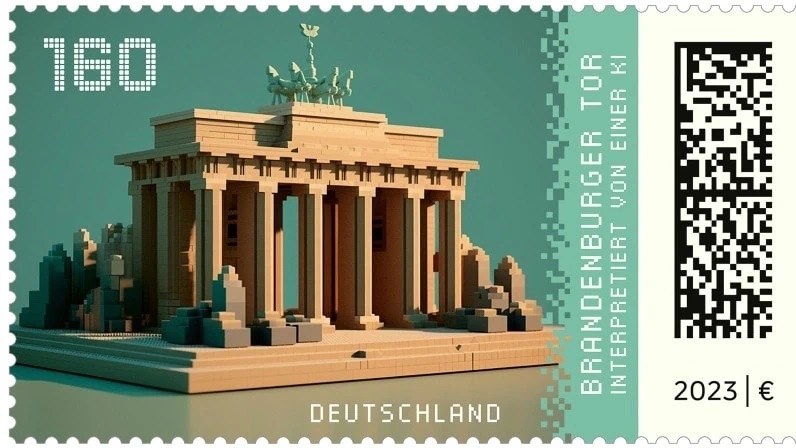Germans can now order a ‘crypto stamp’ with images of historic buildings, rendered by artificial intelligence (AI). The stamp, which will be released by Deutsche Post in November, is already available for pre-order and will be available in both physical form and as a non-fungible token (NFT).
Germany’s first NFT stamp shows an AI interpretation of the Brandenburg Gate in Berlin
Deutsche Post, part of the DHL Group and successor to the former German postal authority Deutsche Bundespost, is preparing to issue an official crypto stamp. It comes as a physical stamp and as a blockchain-based digital version, or NFT.
Both the original stamp and the access information for the tokenized stamp will be included in a booklet that can be ordered since mid-October, reports BTC Echo. “The offer has been very well received and exceeds our expectations,” a spokesperson told the German crypto news channel.
A total of 250,000 copies will be issued, the Deutsche Post representative said, noting that the relatively large circulation is also intended to cater to the traditional German philatelic community, which is one of the largest in the world.
The first stamp in the series, which will depict historic locations and buildings, has the imprint “Germany” on it and shows an image of Berlin’s Brandenburg Gate, as interpreted by AI. It represents a simplified view of the monument and its surroundings that resembles the pixelated style commonly associated with the digital world.

Source: Federal Ministry of Finance, Germany.
The crypto stamp has a postage value of €1.60 and will be available from November 2 in the Deutsche Post online shop. The retail price of the combo with the NFT is €9.90. Another 800,000 copies will be issued as conventional stamps. The official issuer of all stamps with the German mark is the Federal Ministry of Finance.
Crypto stamps have already been issued by other postal services around the world. In September 2021, Swiss Post announced it will offer one to “bridge the gap between the physical and digital worlds in philately.” When the stamp was launched in November that year, high demand caused the state-owned company’s online store to crash.
Do you think crypto stamps will become a big draw for philatelists and NFT collectors? Tell us in the comments below.

